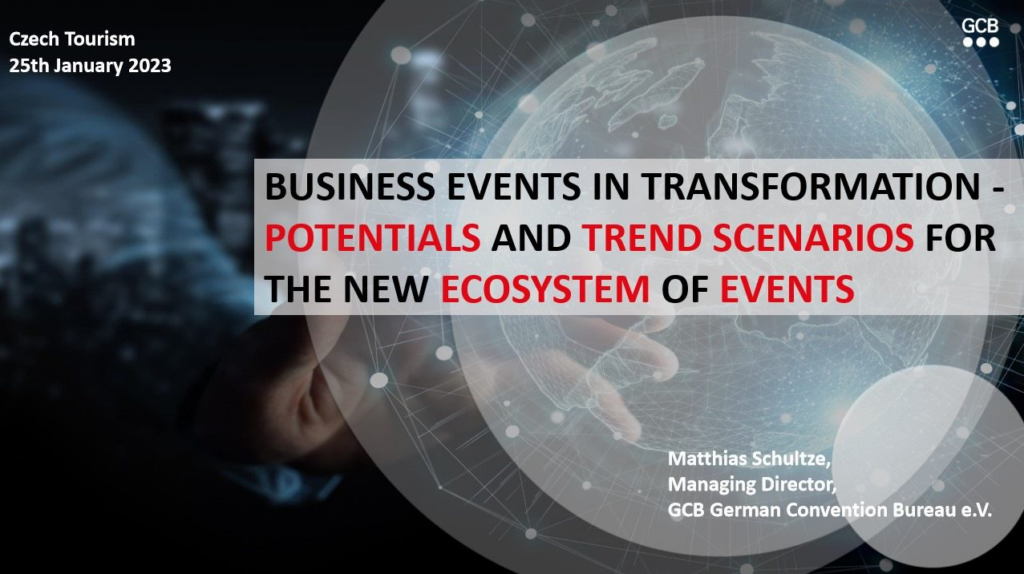How will the future of MICE develop? This question is probably asked by everyone in our industry, especially in the recent, very turbulent years. One of the most interesting and comprehensive insights into the subject came from Matthias Schultze, director of the German Convention Bureau, at the Inspirational Afternoon organised by the Czech Convention Bureau in January. In his engaging lecture to the Czech audience, he outlined three possible scenarios for future developments.
1. Tried and trusted
Traditional model with classical distributions of roles in the company. Emphasis is placed on stable organizational structures, with a typical need to be physically present in the office and rigid working hours. Policy focuses on national development, security, strengthening regional markets and relocation of production.
IMPACT ON MICE: Events typically take place in large dedicated spaces in traditional business centres. Traditional event formats dominate, mostly face-to-face. Precise itineraries, fewer workshops and experiments, personal experience, safety factors and customer focus are important.
2. Diverse and flexible
In this model, the importance of creativity and innovation is growing. It typically takes place in densely populated centres, in a culturally diverse society. People are perceived as global citizens and diversity is seen as important for stability and resilience. This model favours face-to-face encounters and communication. On a personal level, the emphasis is on work-life balance and an individual sense of fulfilment. Remote working, a 30-hour working week and a multifunctional, diverse work environment are the norm. The use of public transport is increasing, while government regulations are decreasing. Nations are no longer the main organisational units.
IMPACT ON MICE: Unique, authentic locations are in the spotlight. The attractiveness of city centres is growing, for example by using smaller venues, pop-up events, multi-purpose locations. Emphasis on efficient and sustainable use of space.
Face-to-face encounters and communication will remain the most important factors for attending events as they strengthen relationships, enable interaction and also bring elements of fun. In the future, attention will be paid to creating spaces that facilitate spontaneous and unplanned experiences.
As virtual events grow, demand for streaming studios, technical equipment and digital infrastructure is also expected to increase. Greater demands will be placed on digital skills. New positions such as Interface Managers and AI experts will be in high demand. However, despite the growing importance of technology, soft skills such as understanding different cultures, empathy, tolerance, flexibility, and personal responsibility will remain crucial for success.
3. Green and aware
In this scenario, businesses and consumers are becoming increasingly environmentally conscious and looking for ways to minimise their impact on the environment. There is a growing interest in alternative communities, urban farming and gardening, and finding a balance between urban and rural. People’s awareness of health and ecology is increasing, and this new setting of individuals then sets the direction of society. Adherence to climate principles is guarded by strict regulations. The sharing economy is an increasingly common part of life. Working from home is the norm; business trips must have a justifiable purpose to take place.
IMPACT ON MICE: Emphasis on leveraging existing infrastructure. Events take place in large decentralized halls and smaller locations in the middle of cities.
New innovative event formats are being developed that have a line to the environment and use green technology. The trends are spontaneity, activism, improvisation, frugality, hands-on experiences, mindfulness, and an emphasis on health. Symbiosis between natural and man-made environments is the key.
New roles and possibilities are emerging. Sustainability managers are becoming increasingly common as there is a growing demand for training and education on topics such as ecology and sustainability. The use of green technologies is also on the rise.

Final thoughts
The face of the MICE industry is currently changing dramatically and presents many opportunities for innovation. To succeed in this new landscape, event organizers must adopt a new mindset that prioritizes personalized services and values the opinions of participants. It is also essential to recognize the enduring importance of face-to-face interactions and the power of sensory experiences in creating memorable events. Moving forward, event planners should focus on developing authentic regional concepts, creative workshops, slow events, and smart systems that provide attendees with the time and space they need to fully engage with these experiences.
Other opportunities for MICE event organizers include: revitalization of public spaces, 2D/3D projections, mixed reality, authentic experiences through regional storytelling, visiting manufactories, new culture of refreshments, smart mobility,… Flexibility will be a priority in every case.
As the great naturalist Charles Darwin once said, “It is not the strongest of the species that survives, nor the most intelligent that survives. It is the one that is most adaptable to change.” With this in mind, those who are able to adapt and innovate in the MICE industry will be best positioned for success in the years to come.